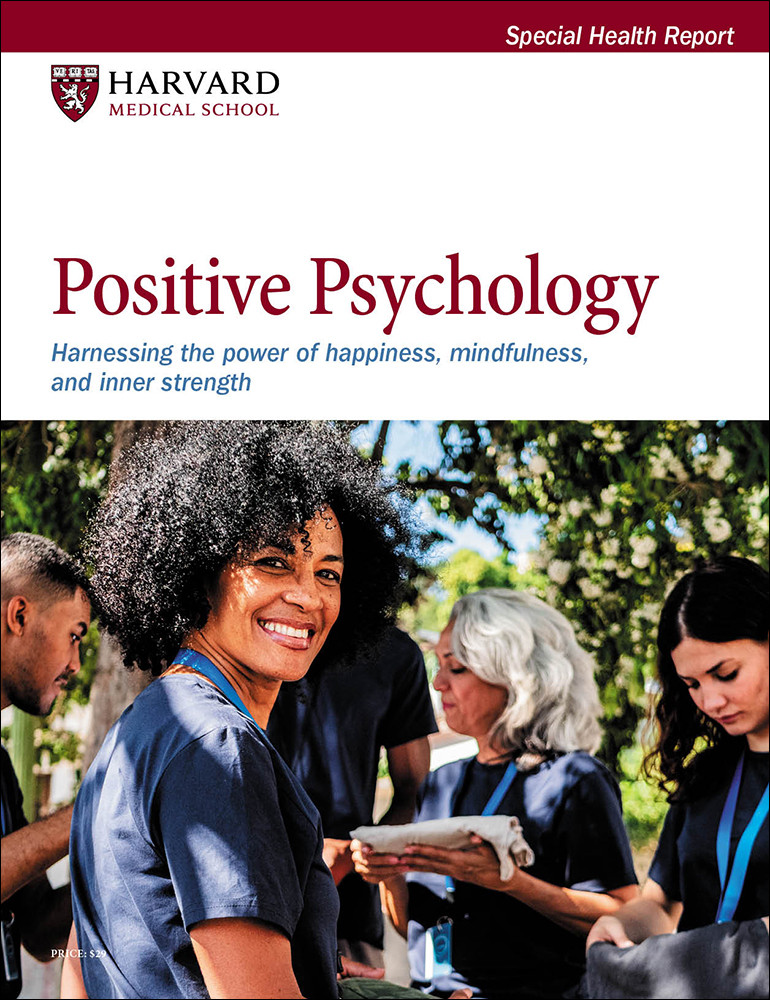Mood boosters
Feeling low? Here are some ways to clear your head and lift your spirits.
- Reviewed by Howard E. LeWine, MD, Chief Medical Editor, Harvard Health Publishing; Editorial Advisory Board Member, Harvard Health Publishing

Everyone goes through periods of feeling low, lethargic, or stressed. These episodes usually pass after a while, but sometimes, you get stuck in a mental and emotional rut. When that happens, here are some strategies that can help pull you out.
Get moving
Exercise stimulates your brain's production of endorphins — chemicals that create a sense of euphoria.
A recent review of more than 1,000 trials published online on Feb. 16, 2023, by the British Journal of Sports Medicine found that compared with people who were sedentary, those who engaged in regular physical activity, like walking, resistance training, Pilates, and yoga, reduced their anxiety levels and improved mild depression-related symptoms.
Other research suggests aerobic exercise can have a powerful effect on mood. Any type of exercise is helpful, according to Dr. Darshan Mehta, medical director at the Benson-Henry Institute for Mind Body Medicine at Harvard-affiliated Massachusetts General Hospital. "Your exercise could be as simple as tending your garden or working on house projects," he says. "The point is to get moving, and move often."
Hang out with nature
Scientists believe spending time in a natural environment can calm neural activity in the prefrontal cortex, a brain region associated with negative emotions. Research also has found that interacting with nature can lower blood pressure and cortisol, the stress hormone. The type of setting doesn't matter as long as you find it soothing. "So, you walk a nature trail or sit in an urban green space," says Dr. Mehta. If you can't make it outside, looking at pictures of inspiring nature settings and listening to nature sounds on your smartphone or computer can have a similar effect.
Train your brain
"Engaging in mentally stimulating activities like painting and other art forms, learning to play a musical instrument, or learning a language can be a great mood booster, as they provide a sense of accomplishment," says Dr. Mehta.
Practice gratitude
Identifying and writing down things for which you are grateful can help offset feeling anxious or stressed. Begin a journal to record these examples of gratitude. Your entries might include big-picture items like your ability to exercise daily and enjoy a circle of close friends, or even satisfying occurrences like a friendly exchange at a store. "Try to provide details about why you are thankful and how these items improve your outlook," says Dr. Mehta. You don't have to write every day — some studies have found that even just once a week is helpful.
Lend a helping hand
You can reap many emotional rewards through volunteering. A study of 13,000 older adults, published in the August 2020 issue of the American Journal of Preventive Medicine, found that people who volunteered at least two hours per week felt happier and more optimistic than those who didn't. "Volunteering also can boost self-esteem by providing a sense of purpose," says Dr. Mehta.
Make time to meditate
Practicing meditation can help you reduce stress by focusing on the present moment rather than ruminating about the past or future. You can learn the basics via online guided meditations at www.bensonhenryinstitute.org/guided-relaxation-exercises.
When to seek helpIf your symptoms last for two weeks or longer or begin to interfere with daily life—for instance, if you're not sleeping well, becoming more isolated, or losing interest in favorite activities—you may be in the early stages of mild or moderate depression and should talk with your doctor. "Life changes like health issues or the loss of a spouse, family member, or friend can trigger depression symptoms, so be aware of any mood or lifestyle changes that occur after such events," says Dr. Darshan Mehta, medical director at the Benson-Henry Institute for Mind Body Medicine. |
Image: © Westend61/Jo Kirchherr/Getty Images
About the Author

Matthew Solan, Former Executive Editor, Harvard Men's Health Watch
About the Reviewer

Howard E. LeWine, MD, Chief Medical Editor, Harvard Health Publishing; Editorial Advisory Board Member, Harvard Health Publishing
Disclaimer:
As a service to our readers, Harvard Health Publishing provides access to our library of archived content. Please note the date of last review or update on all articles.
No content on this site, regardless of date, should ever be used as a substitute for direct medical advice from your doctor or other qualified clinician.
















